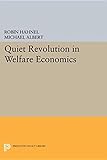Quiet Revolution in Welfare Economics / Michael Albert, Robin Hahnel.
Material type: TextSeries: Princeton Legacy Library ; 5028Publisher: Princeton, NJ : Princeton University Press, [2017]Copyright date: ©1990Description: 1 online resource (454 p.)Content type:
TextSeries: Princeton Legacy Library ; 5028Publisher: Princeton, NJ : Princeton University Press, [2017]Copyright date: ©1990Description: 1 online resource (454 p.)Content type: - 9781400887057
- 330.15/56 23
- HB846 .H34 2017
- online - DeGruyter
| Item type | Current library | Call number | URL | Status | Notes | Barcode | |
|---|---|---|---|---|---|---|---|
 eBook
eBook
|
Biblioteca "Angelicum" Pont. Univ. S.Tommaso d'Aquino Nuvola online | online - DeGruyter (Browse shelf(Opens below)) | Online access | Not for loan (Accesso limitato) | Accesso per gli utenti autorizzati / Access for authorized users | (dgr)9781400887057 |
Browsing Biblioteca "Angelicum" Pont. Univ. S.Tommaso d'Aquino shelves, Shelving location: Nuvola online Close shelf browser (Hides shelf browser)

|

|

|

|

|

|

|
||
| online - DeGruyter The Essays of Erich Neumann, Volume 3 : The Place of Creation / | online - DeGruyter C.G. Jung and the Humanities : Toward a Hermeneutics of Culture / | online - DeGruyter The Formation of Ch'an Ideology in China and Korea : The Vajrasamadhi-Sutra, a Buddhist Apocryphon / | online - DeGruyter Quiet Revolution in Welfare Economics / | online - DeGruyter Pier Paolo Pasolini : Cinema as Heresy / | online - DeGruyter Entailment, Vol. II : The Logic of Relevance and Necessity / | online - DeGruyter The Pleasure Gardens of Virginia : From Jamestown to Jefferson / |
Frontmatter -- Contents -- List of Theorems -- List of Figures -- Acknowledgments -- Introduction -- Part One. Limits of Traditional Welfare Theory -- 1. Traditional Welfare Theory -- 2. The Labor Process -- 3. Externalities and Public Goods -- 4. Endogenous Preferences and Institutions -- Part Two. Anew Welfare Theory -- 5. A New Welfare Paradigm -- 6. A New Welfare Theory -- Part Three. New Results -- 7. Markets -- 8. Private Enterprise -- 9. Central Planning -- 10. Conclusion -- Notes -- Index
restricted access online access with authorization star
http://purl.org/coar/access_right/c_16ec
This ambitious work presents a critique of traditional welfare theory and proposes a new approach to it. Radical economists Robin Hahnel and Michael Albert argue that an improved theory of social welfare can consolidate and extend recent advances in microeconomic theory, and generate exciting new results as well. The authors show that once the traditional "welfare paradigm" is appropriately modified, a revitalized welfare theory can clarify the relationship between individual and social rationalitya task that continues to be of interest to mainstream and nonmainstream economists alike. Hahnel and Albert show how recent work in the theory of the labor process, externalities, public goods, and endogenous preferences can advance research in welfare theory. In a series of important theorems, the authors extend the concept of Pareto optimality to dynamic contexts with changing preferences and thus highlight the importance of institutional bias. This discussion provides the basis for further analysis of the properties and consequences of private and public enterprise and of markets and central planning. Not surprisingly, Hahnel and Albert reach a number of conclusions at odds with conventional wisdom.Originally published in 1990.The Princeton Legacy Library uses the latest print-on-demand technology to again make available previously out-of-print books from the distinguished backlist of Princeton University Press. These editions preserve the original texts of these important books while presenting them in durable paperback and hardcover editions. The goal of the Princeton Legacy Library is to vastly increase access to the rich scholarly heritage found in the thousands of books published by Princeton University Press since its founding in 1905.
Mode of access: Internet via World Wide Web.
In English.
Description based on online resource; title from PDF title page (publisher's Web site, viewed 30. Aug 2021)


